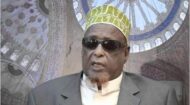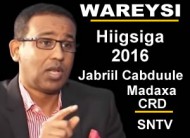PORTLAND, Ore. — A 21-year-old Somali-American arrested here in late 2010 after pushing a cellphone button to trigger what he believed was a huge car bomb — in fact an elaborate and inert F.B.I. decoy device — was convicted on Thursday in Federal District Court of attempting to use a weapon of mass destruction. He faces up to life in prison.
Multnomah County Sheriff, via Associated Press
Mohamed Osman Mohamud could face up to life in prison.
The jury, deliberating for one day, rejected the assertion by the defendant, Mohamed Osman Mohamud, that he had been entrapped and induced into a terrorist act by F.B.I. agents posing as radical Islamic militants. His lawyers argued that the undercover operatives, having invested major resources and time into the case, manipulated Mr. Mohamud into a plot he would never have undertaken on his own.
“We’re disappointed,” said Stephen R. Sady, Mr. Mohamud’s lead lawyer, who said the verdict would be appealed. “We obviously thought he was entrapped.”
Mr. Sady said he hoped that Senior Judge Garr M. King, who set sentencing for May 14, would consider mitigating evidence that came out in the trial. Mr. Mohamud showed little obvious emotion as the verdict was read by Judge King or as he was led from the courtroom, where the sound of shackles applied to his wrists could be heard.
Amanda Marshall, the United States attorney for Oregon, said in a news conference after the verdict, “We are hopeful that this will bring closure and healing to all of us here in Portland.” She said the case had raised strong feelings on both sides, and among local Somalis. “It’s complicated; it hasn’t been easy,” she said.
The case gripped Oregon and seized national attention in November 2010, partly through a glimpse of undercover policing of terrorism in the sting operation that ensnared Mr. Mohamud. Perhaps even more, it was because of the setting: a Christmas tree lighting ceremony in Pioneer Courthouse Square, Portland’s premier open-space oasis, packed on the night of the attack with about 25,000 people.
What had loomed large and global at the time — with its hints of international terrorist intrigue — ultimately became, through the two weeks of testimony, a smaller, more intimate story of psychology. The jury, in assessing hours of secretly recorded conversations and evidence of what seemed a typical college student’s life at Oregon State University, was asked to decide whether the thin young man sitting with lawyers was a romantic, hate-filled fantasist who just wanted to strike a pose, or a genuine jihadist nipped in the bud before violence could be done.
Whether Portland was ever actually threatened became part of the debate at the trial.
Undercover F.B.I. agents testifying for the prosecution said that they feared Mr. Mohamud could have connected with real terrorists and bombmakers had they not intervened with a sting operation. Mr. Mohamud’s lawyers, by contrast, argued that the case was all about the character of a callow, immature young man. They called witnesses, including friends and family members of the defendant who called him goofy and fun-loving, and a threat-assessment expert who said that the bellicose bluster about radical Islam — in articles, journal entries and comments recorded by the F.B.I. — was nothing more than adolescent chest-thumping.
“This case is a tragedy,” Mr. Sady said in his summation to the jury on Wednesday.
Portland residents interviewed on Thursday in the square where the attack was to have occurred mostly said they had paid little attention to a trial about what might have been.
“Guns are more of a concern to me,” said Dana Odling, a retired food service worker for the federal Department of Veterans Affairs. She said that especially since the shootings in Newtown, Conn., and at a shopping mall just outside Portland — both in December — she had been much more conscious of the potential mayhem that one person with a store-bought weapon could create. “Something like that can happen anytime, anywhere,” she said.

 All Posts
All Posts











